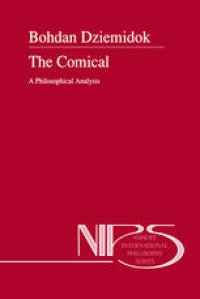
Ebook: The Comical: A Philosophical Analysis
Author: Bohdan Dziemidok (auth.)
- Tags: Humanities general, Fine Arts, Comparative Literature, Social Sciences general, Anthropology
- Series: Nijhoff International Philosophy Series 47
- Year: 1993
- Publisher: Springer Netherlands
- Edition: 1
- Language: English
- pdf
The problem of the comical is one of the most interesting issues in aesthetics. Its significance extends well beyond the sphere of aesthetic studies and has at tracted the attention of the scholars working in other fields such as the theorists and historians of particular art forms, sociologists, psychologists, as well as anthropologists, ethnographers and the theorists of education. Philosophy has devoted a lot of attention to the comical. Since Aristotle al most every philosopher has felt obliged to comment on this question. However, even though they have offered a number of accurate observations on the subject, the philosophers involved in the discussion about the comical have earned a reputation of being rather devoid of the sense of the comical and many a time their considerations have been compared to those of a blind man talking about colours. And yet the problem of the comical kept attracting them to such an ex tent that they paid no heed to the difficulties involved and neglected the risk of becoming ridiculous themselves. Adolf Zeissing once remarked that all the litera ture on the comical is a "comedy of errors" committed while defining the comi cal. Yet even he could not resist the temptation of adding another page to this "comedy of errors". Tadeusz Boy-Zeleriski claimed that the good thing about the philosophical writing concerning the comical is that it offers not only the theory of the comical but at the same time is the theory's practical application.
The book offers an extensive and detailed philosophical analysis of the phenomenon of the comic. The author critically presents the hitherto existing theories of the comic from Aristotle up to the present and classifies them. At the same time he advances his own definition of the comic as a broadly understood deviation from norm, which takes into account the deviation from an objectively existing norm as well as the subjective sense of the normal. Many pages have been devoted to the analysis of the main forms of the comic. The author offers their taxonomy and discusses the major techniques of evoking the comic.
The final part of the book deals with the social aspects of the comic and discusses the social role of humour, mockery, satire, irony, etc. The author elaborates on the educational, integrating, punitive, and therapeuric aspects of various forms of comic activities.
The book is based upon ample material drawn from a multitude of sources. The author does not limit the scope of his analysis to the philosophical and the aesthetic aspects of the comic but takes into account its extra-aesthetic occurrences and applications as presented by psychologists, cultural anthropologists, sociologists, theoreticians and historians of literature, film, and music, which makes the work truly interdisciplinary in character.
The Comical: A Philosophical Analysis will be useful to aestheticians and philosophers of art, as well as to the students of literary criticism, theatre, and film studies, educational theory, psychology and even the theory of argumentation.